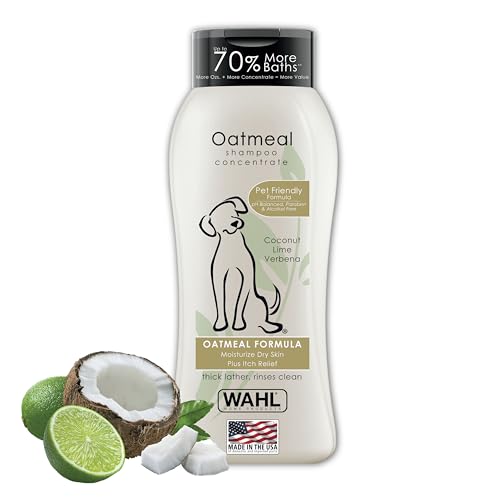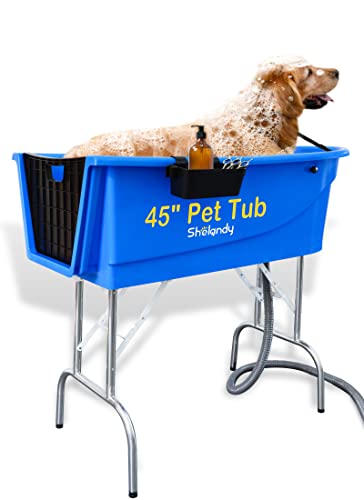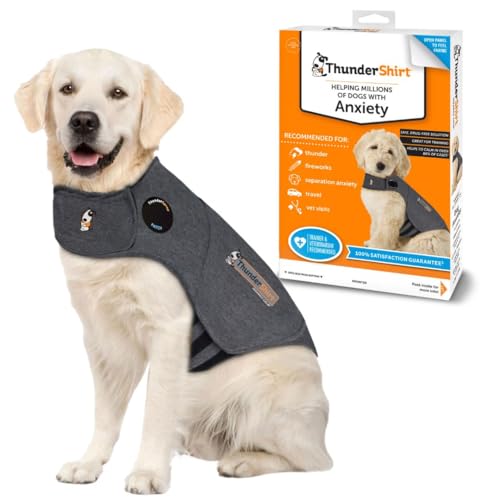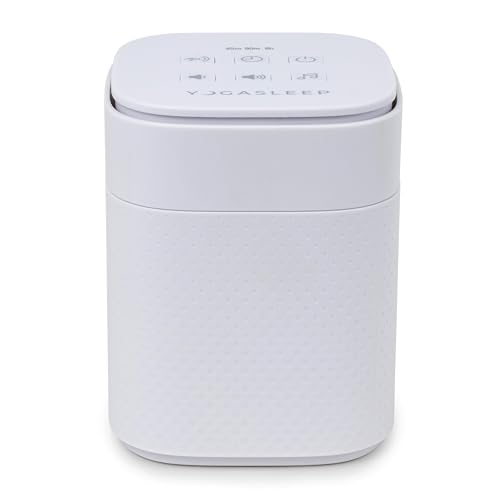If your dog struggles with anxiety, you know how hard it can be to see them restless, scared, or stressed. You want to help your furry friend feel calm and safe, but where do you start?
Understanding what vets give dogs for anxiety can make a big difference in your pet’s comfort and happiness. You’ll discover the common treatments and medications vets recommend to ease your dog’s worries. Keep reading to find the best ways to support your dog’s mental health and bring peace back to your home.

Credit: www.yahoo.com
Common Causes Of Dog Anxiety
Understanding the common causes of dog anxiety is crucial if you want to help your furry friend feel calm and secure. Anxiety in dogs can stem from different triggers, and knowing these can guide you toward the right treatment or behavioral adjustments. Let’s look at some of the main reasons dogs become anxious and what signs you might notice.
Separation Anxiety
Separation anxiety occurs when dogs become distressed after being left alone. You might see behaviors like excessive barking, chewing, or trying to escape when you prepare to leave. Have you ever noticed your dog pacing or whining as you grab your keys? That’s often a sign they’re worried about being alone.
Dogs with separation anxiety don’t just miss you; they feel unsafe without your presence. This makes it important to create a routine that helps them feel more secure during your absence. Small steps like short departures and arrivals can help ease their stress over time.
Noise Phobias
Loud noises such as thunderstorms, fireworks, or construction sounds can trigger intense fear in many dogs. Some may hide, tremble, or even try to run away. If your dog reacts strongly to sounds you barely notice, they might be suffering from noise phobia.
Noise phobias can escalate if ignored, leading to chronic anxiety. You can help by providing a safe, quiet space or using calming aids during known noisy events. Do you know what specific sounds set your dog off? Identifying these triggers is the first step toward managing their fear.
Social Stress
Not all dogs are comfortable around other animals or unfamiliar people. Social stress happens when your dog feels threatened or overwhelmed in social settings. Signs include growling, cowering, or trying to hide behind you.
Social stress can limit your dog’s ability to enjoy walks or visits to the park. Gradual, positive exposure to new friends and environments often helps build their confidence. Have you noticed if your dog prefers quiet walks over busy streets? Observing their comfort level can guide your approach.
Changes In Environment
Moving to a new home, rearranging furniture, or adding a new family member can unsettle your dog. These changes disrupt their sense of routine and safety, causing anxiety. Dogs thrive on predictability, so sudden changes can make them feel insecure.
To reduce stress from environmental changes, introduce new elements slowly and maintain familiar routines as much as possible. Offering extra attention and reassurance helps your dog adjust. What changes have you made recently that might have affected your dog’s behavior?
Veterinary Medications For Anxiety
Veterinary medications for anxiety help dogs feel calmer and more relaxed. These treatments target the nervous system to reduce stress and fear. Vets choose the best option based on the dog’s condition and behavior. Some dogs need stronger drugs, while others benefit from natural aids. Understanding these choices helps pet owners support their dogs effectively.
Prescription Anti-anxiety Drugs
Vets prescribe anti-anxiety drugs to manage severe stress in dogs. These medications balance brain chemicals that affect mood and behavior. Common drugs include:
- Fluoxetine – Often used for separation anxiety.
- Sertraline – Helps reduce panic and fear.
- Clomipramine – Controls compulsive behaviors.
These drugs require a vet’s supervision and regular checkups. Dosage depends on the dog’s size, age, and health. Effects usually appear after a few weeks.
Natural Supplements
Natural supplements offer a gentle way to ease anxiety. They work by calming the nervous system without strong chemicals. Popular options include:
- CBD oil – Reduces stress and promotes relaxation.
- Melatonin – Helps regulate sleep and calm nerves.
- L-theanine – An amino acid that supports brain health.
Many owners prefer supplements for mild anxiety or alongside other treatments. Always check with a vet before starting any supplement.
Sedatives And Tranquilizers
Sedatives and tranquilizers provide quick relief for acute anxiety episodes. They slow down the nervous system to reduce panic and agitation. Common types are:
- Acepromazine – Used for travel anxiety or vet visits.
- Diazepam – Helps with sudden stress or seizures.
- Alprazolam – Controls panic attacks and extreme fear.
These medications work fast but are not for long-term use. Vets carefully monitor dogs to avoid side effects and dependence.
Behavioral Therapies And Training
Behavioral therapies and training are key tools vets use to help dogs with anxiety. These approaches focus on changing how dogs feel and react to stress. They teach dogs new, calm behaviors. This helps reduce fear and panic in difficult situations.
Training also strengthens the bond between dogs and their owners. It builds trust and confidence. This creates a safer, happier environment for the dog. Many vets recommend combining these therapies with other treatments for the best results.
Desensitization Techniques
Desensitization means slowly exposing dogs to things that scare them. The exposure starts very mild and grows over time. This helps dogs get used to triggers without feeling overwhelmed.
The goal is to reduce the dog’s fear response. For example, a dog afraid of loud noises may hear soft sounds first. The volume increases only when the dog stays calm. This gradual process helps dogs feel safer.
Counter-conditioning
Counter-conditioning changes a dog’s negative feelings into positive ones. It pairs scary situations with treats or praise. The dog begins to expect good things during these moments.
This technique works well with desensitization. As the dog faces a trigger, rewards help shift emotions. Over time, anxiety lessens and the dog reacts more calmly.
Obedience Training
Obedience training teaches dogs basic commands and self-control. Commands like “sit,” “stay,” and “come” help manage anxious behavior. Training sessions also provide mental exercise, which calms dogs.
Consistent training builds routine and structure. This predictability helps anxious dogs feel secure. It also improves communication between dogs and owners.
Non-medical Calming Aids
Non-medical calming aids can be a great option for managing your dog’s anxiety without relying solely on prescription medications. These aids often work by providing comfort, distraction, or a soothing environment. They can be especially helpful for mild to moderate anxiety or as a complement to other treatments.
Calming Collars And Wraps
Calming collars and wraps apply gentle pressure, similar to a comforting hug. This pressure can help reduce stress signals in your dog’s nervous system. Many owners notice their dogs becoming calmer during fireworks or thunderstorms with these aids.
Have you tried a snug wrap during a stressful event? Some dogs respond quickly, showing less pacing and whining. Look for adjustable collars and wraps to ensure a comfortable fit for your dog.
Aromatherapy And Essential Oils
Certain scents like lavender and chamomile can soothe anxious dogs. Aromatherapy uses these essential oils in diffusers or sprays to create a calming atmosphere. Always use dog-safe oils and avoid direct contact with your pet’s skin or nose.
Did you know some vets recommend lavender sprays on bedding or in the room? This can make a noticeable difference, especially for dogs sensitive to loud noises or separation. Experiment with different oils, but watch your dog’s reaction carefully.
Music And Environmental Adjustments
Music designed for dogs, like classical or specially composed tracks, can lower anxiety levels. Playing these tunes during alone time or stressful moments helps mask disturbing sounds. Creating a quiet, safe space with familiar items also supports your dog’s emotional well-being.
Have you observed how your dog reacts to background noise? Turning on soft music or white noise might reduce barking and restlessness. Small changes like closing curtains or using blackout blinds can also minimize visual triggers and help your dog feel secure.
When To Consult A Vet
Knowing the right time to consult a vet is key for dogs with anxiety. Anxiety can look different in every dog. Some signs need quick attention. Vets help find the best treatment to ease your dog’s stress safely. Early vet visits can prevent worse problems.
Recognizing Severe Anxiety Symptoms
Severe anxiety shows through clear signs. Watch for:
- Constant pacing or shaking
- Excessive barking or whining
- Destructive chewing or digging
- Loss of appetite
- Hiding or avoiding people
- Repeated licking or self-harm
These symptoms need a vet’s care soon. They can cause harm or indicate deeper issues.
Tailoring Treatments To Individual Dogs
Each dog reacts to anxiety differently. Vets check health, age, and anxiety type. They may suggest:
- Behavioral training
- Natural supplements
- Prescription medications
- Environmental changes
Custom treatment helps dogs recover faster and feel safer.
Monitoring And Follow-up
After starting treatment, vets track progress. Regular check-ups make sure the plan works well. They adjust doses or try new options if needed. Owners should watch for new or returning symptoms. Teamwork between vet and owner keeps dogs calm and healthy.

Credit: www.yahoo.com
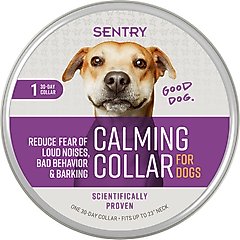
Credit: www.petmd.com
Frequently Asked Questions
What Medications Do Vets Prescribe For Dog Anxiety?
Veterinarians often prescribe medications like Prozac, Zoloft, or Clomipramine for dog anxiety. These are typically SSRIs or antidepressants. Other options include benzodiazepines like Xanax or Valium, which can be used for acute anxiety episodes. Always consult a vet for proper diagnosis and prescription.
Are Natural Remedies Effective For Dog Anxiety?
Natural remedies can be effective for mild anxiety in dogs. Options include CBD oil, calming pheromone sprays, and herbal supplements like chamomile or valerian root. These may help soothe anxiety symptoms. However, consult your vet to ensure these remedies are safe and suitable for your dog’s condition.
How Do Vets Diagnose Anxiety In Dogs?
Vets diagnose anxiety in dogs through behavioral observations and medical history analysis. They look for symptoms like excessive barking, pacing, or destructive behavior. A physical exam may rule out medical issues. Sometimes, diagnostic tests are conducted to ensure anxiety isn’t a symptom of another ailment.
Are Behavioral Therapies Useful For Anxious Dogs?
Behavioral therapies are effective for managing anxiety in dogs. Techniques like desensitization and counterconditioning help dogs adjust to stressors. Professional trainers or behaviorists often guide these therapies. Combining them with medication or natural remedies can enhance results and improve a dog’s overall well-being.
Conclusion
Veterinarians offer several treatments to help dogs with anxiety. These include medications, natural supplements, and behavior therapy. Each dog’s needs are different, so vets choose the best option carefully. Owners should watch their pets closely and share any concerns with the vet.
Managing anxiety improves dogs’ happiness and health. Always seek professional advice before starting any treatment. Helping your dog feel calm makes a big difference. Small steps lead to better days for your furry friend.

